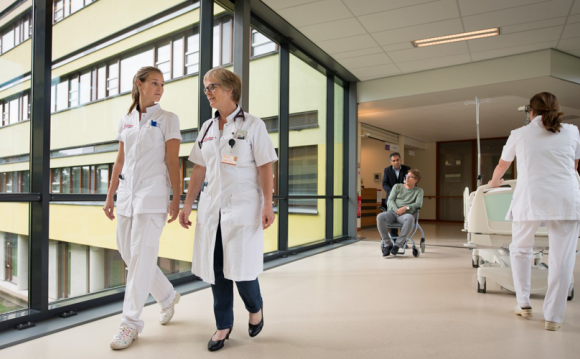Research themes
The RN2Blend researchers each have their own line of research, but also take part in a collaborative section. This substudy focuses on historical developments in the field of differentiated practice. It looks at what preceded the current discussion on differentiated practice, who the main players were, and what their objectives were with regard to differentiated practice in nursing. These are the key questions dealt with in this substudy.
This subsection deals with the development of values within the nursing profession. Iris Wallenburg, Martijn Felder, Roland Bal and Syb Kuijper examine the way in which nurses position themselves in the field of healthcare and healthcare policy, and they examine the consequences thereof with regard to professional development and practice in healthcare. The researchers also look at how differentiated practice is implemented in daily healthcare practice, and how nursing practice relates to that of other healthcare professionals.
The main focus of this substudy is the learning history method. Pieterbas Lalleman and Lisette Schoonhoven, in collaboration with PhD candidate Dieke Martini and public historian Hugo Schalkwijk, examine task differentiation in nursing care, both now and in the past. They map out important moments over the past 30 years and link these to current development requirements in the Dutch nursing profession. They will also record a learning history with respect to differentiated nursing practice in a number of hospitals. The researchers expect this to illustrate the various ideas, visions, successes and efforts of all those involved within these institutions. The conclusion of each study and the dissemination of the results will take the form of podcasts and a written learning history. This could serve as a basis for further talks within and outside the hospitals in order to facilitate learning about differentiated practice.
In this substudy, Catharina van Oostveen, Hester Vermeulen and PhD candidate Julia van Kraaij examine the effectiveness of differentiated practice on staff and patient outcomes. They are also looking at the role that nurses’ working environment plays in the realisation of differentiated practice. This should provide knowledge about the optimum mix of tasks, and the environment in which nurses like to work and are able to provide good care. The FD Tool is an instrument that provides hospitals with insight into the effect of differentiated practice and is an important source of data.
Researchers from University Medical Center Utrecht are conducting a line of research under the title ‘Strengths & capabilities: designing nursing practice in a changing nursing environment.’ Researchers Dewi Stalpers, Marloes Veenstra and Lisette Schoonhoven are examining questions regarding the optimisation of nurse employability, the role of job crafting* in this respect, and what this means for nurses, the team and the organisation.
The hypothesis is that differentiation based on individual strengths and capabilities could contribute towards:
• providing nurses with insight into their individual strengths and how to make the best use of them (reflective professionals);
• showing nurses what kind of impact they could make on patient care and how much influence they have;
• providing organisations with insight into how to make the best use of nursing professionals’ capabilities (organisational support);
Special attention is also given to developments in the role and tasks of nurses, and how nurses deal with changes in their work. The final topic deals with the question of what effects these have on the quality of patient care, and on job satisfaction among nurses. The FD Tool is an important source of data in this substudy. This is an instrument that provides hospitals with insight into the effects of differentiated practice on quality with respect to patients, staff and organisations.
*Definition of job crafting: Facilitating changes in the characteristics of a person’s job in order to better align that job with personal needs, interests and capabilities.
The substudy ‘Reorganised nursing care: costs and value’ looks at the value and the cost of nursing care. The substudy is being conducted by Lucas Goossens, Maureen Rutten-van Mölken from Erasmus University Rotterdam. They examine subjects such as how health outcomes and costs change as a result of deploying nurses in a different manner. The researchers demonstrate the value that patients attach to various nurse-sensitive outcomes and other characteristics of their treatment. They also look at nurses’ preferences for various aspects of their work. In other words: how can their work be made as attractive as possible?
Kennisnet
If you would like to join the discussion (in Dutch), please register for the Differentiated Practice Group on NVZ Kennisnet. Through this network you can exchange knowledge and experience relating to all aspects of differentiated practice in nursing.
